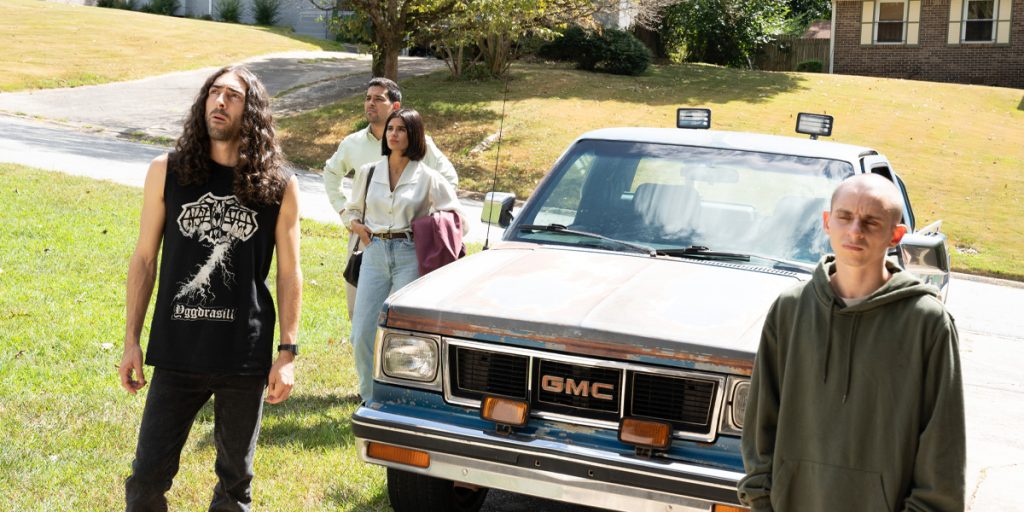Blast Beat has a compelling story of a migrant Colombian family coming to America and strong character dynamics, but sacrifices focus with a too-broad range of themes.
Stories about immigrants coming to the United States are becoming more common in American media, and I’m glad that these voices are finally getting to be heard and taken seriously. There are a myriad of reasons why a family may pack up and head to the States, and it’s good to be exposed to as many of these perspectives as we can to remind ourselves that migrants are not a monolith, and have good reason for making the journey despite significant dangers (as of writing this, the US still has migrant children in cages, by the way). The most recent film I’ve seen to address an immigrant family coming to America to create a better life is Esteban Arango’s Blast Beat, a solid film that struggles with its focus.
Blast Beat tells the story of a Colombian family who moves to the United States in 1999. The primary focus is on brothers Carly (Mateo Arias) and Mateo (Moises Arias); Carly is a science prodigy and heavy metal fan who dreams of working for NASA, while Mateo lacks any clear life goals outside of causing mischief with his friends.
Blast Beat’s greatest assets are its characterization and its cast. The main drama of the film lies in the relationship between Carly and Teo, and when you have real-life brothers portraying siblings on film, their representations of that brotherly dynamic definitely come across as genuine. They each do an excellent job conveying the frustrations and joys of brotherhood without either character coming across as better or worse than the other; they’re both human, complete with flaws, hopes, and strengths. Moisas Arias is excellent as the younger brother who resorts to acting out as a way to cope with feelings of powerlessness and alienation, while Mateo Arias perfectly encapsulates the ambitious older child oblivious or uncaring as to how his actions may affect the people he cares about.

Also – this is a little thing, but I liked it – I appreciate how Carly’s identity as a metalhead is presented: as a heavy metal fan myself, it’s nice to see one of us portrayed differently than how we’re typically shown in movies and on TV. We’re all familiar with the archetype of the dunder-headed rocker, as demonstrated by Bill and Ted, Wayne and Garth, Beavis and Butthead, the guys from Airheads, Barley Lightfoot from Onward, etc. And, while I do like these characters and the movies/shows in which they appear, the image of the directionless and none-too-bright slacker spending his entire life listening to Judas Priest in his mom’s basement is a little tired, you know? It’s nice to see a portrayal of a metalhead with actual intellectual curiosity and capacity beyond obscure Norwegian Black Metal trivia and the three Pantera riffs they know how to play poorly.
Conceptually, Blast Beat touches on a lot of topics: since the family is composed of Colombian immigrants, there’s discussion of struggling to assimilate into an American culture and the xenophobia directed towards latinx migrants. There’s also a strong theme of family dynamic and how one sibling may feel left behind or stuck in the shadow of the other, manifesting into friction in the home. There is also the theme of being an adolescent, and the struggles of being young and still figuring yourself out and crafting an identity while not knowing what you’re doing. It also addresses themes of unjust and shady immigration laws and practices, the affordability of higher education in the USA, and all of these things are up against the backdrop of the Colombian Conflict, an ongoing military conflict since the 1960s between, among other participating factions, the Colombian government and guerilla forces.
So yeah, as you can probably see, there’s a lot going on here. Blast Beat tries to discuss a broad range of topics, and while it doesn’t necessarily do a bad job at addressing any of them, the movie never delves into any of these as thoroughly as I would have liked: because it tries to take on so many themes and issues at once, it ends up biting off a bit more than it can chew, and does not give enough focus on any of these things. Essentially, you may be left wanting more resolution or examination into these themes and ideas than you’re going to get. If it had instead focussed on just a couple key topics in greater detail, I think it would have made for a much stronger whole.
Blast Beat is a tough movie to critique because, on one hand, there’s nothing about it I would call “bad;” It is competently made, though there are a few points where I don’t love the lighting. The actors give uniformly good performances, and the plotting and pacing both make sense. But there’s also nothing in there that makes me go, “Wow! I need to watch this again!” By trying to address too much, it feels stretched too thin, and misses the chance to be a great piece of cinema. At the end of the day, however, I’d call Blast Beat a “solid” film. Like I said, the characterization and acting are both quite good, even if the film tries to do too much conceptually. If this seems like the kind of thing that would appeal to you, then I’d give it a recommendation.
Blast Beat is now available to watch on digital and on demand.

